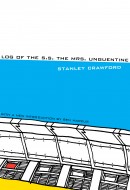Every Thursday on the blog brings a post about a paperback book.
 Originally published in 1972, Log of the S.S. the Mrs Unguentine
Originally published in 1972, Log of the S.S. the Mrs Unguentine is, as Ben Marcus notes in his afterword to an edition published last year by Dalkey Archive Press, “if not science fiction, then really strange fiction.” The story is only 99 pages long, but it’s hard to use a word like novella for a work with such a fully imagined, minutely detailed world.
The narrator is the wife of Unguentine, who begins her dreamlike telling by noting that her husband has recently committed suicide, flinging himself over the side of the boat on which they’ve lived together for “thirty to forty years.” Over those decades, the barge has grown into what Marcus describes as “more landmass than boat.” That floating mass is the star of the show, a stunning creation that a filmmaker like Wes Anderson or Jean-Pierre Jeunet might love to build, but which they couldn’t possibly make more believable than Stanley Crawford makes it on the page. It includes lush gardens, farm animals, 40 trees, “a towering salt-water distillation plant,” and “five hundred sails each the size of a manly handkerchief.” There is also a dome made up of small glass windows, the construction of which is one of the most beautiful passages in the book.
Early in the story, Mrs. Unguentine confesses that her husband is a drinker who beats her, but for the rest of the book he’s portrayed as a hermit who rarely interacts with the only other person in his world. The boat is large enough that the couple “go for days on end without seeing each other.” And even when they do, Unguentine rarely speaks, preferring to write notes.
Because of its deep surreality and the impossible largeness and diversity of the boat, the novel lends itself to allegorical readings about, among other subjects, ecological stewardship and the possibilities (and limitations) of knowing and loving another person. Crawford has said:
My novels all describe “systems” of various degrees of derangement. The plot consists of a description of the system, and the end comes when the description is complete and/or disintegration sets in or takes place.
Combining that thought of Crawford’s with the manic energy, OCD tendencies and prolonged hidings of Unguentine, perhaps thoughts of environmentalism and love would usefully yield to thoughts of personal obsession and the very idea of being in the world. Crawford again:
I would say that the barge is something about “liberation,” but liberation at the cost of too much control and oppression. The best image I might summon up here is the Kavafy poem in which the voyager discovers after long travels that he is still, despite everything, only himself. Another version of a similar theme is [Henry] James’s short story, “The Beast in the Jungle,” in which the terrible fate awaiting the narrator turns out to be the narrator’s fear of living.

